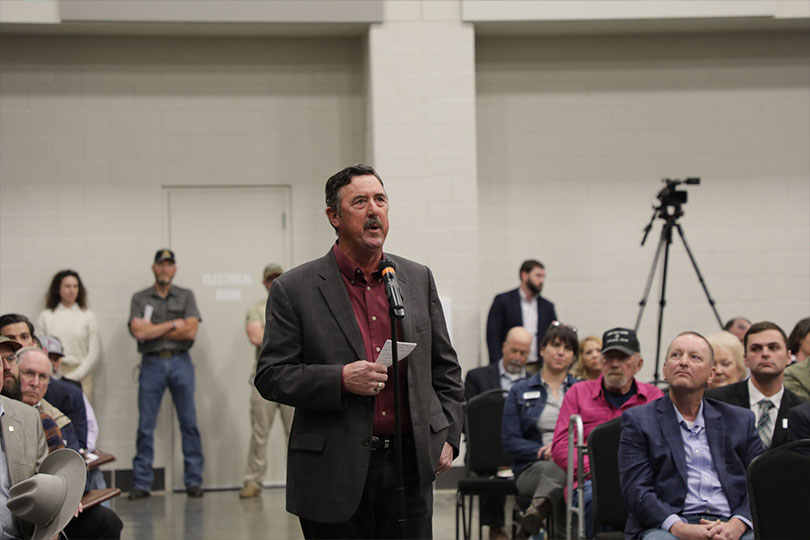By Julie Tomascik
Editor
Farmers, ranchers and dairy producers discussed their needs for the 2023 Farm Bill at a listening session hosted by the U.S. House Agriculture Committee March 15 in Waco.
Those needs included more insurance options for specialty crop producers and contract poultry growers, along with increasing the commodity reference prices to be consistent with inflation.
“The safety net with crop insurance is important to this state. Last year, 2022, was like 2011—super, super dry. So, crop insurance is important,” Texas Farm Bureau (TFB) President Russell Boening said.
Other farmers and ranchers representing various commodity groups also stressed the need for the farm safety net, while noting the difficulty in finding agricultural workers. They discussed the need for adequate resources in the next farm bill to compensate for the lack of funding in existing farm bill commodity programs. This would help in the event of another market or weather-related disaster.
“We’re going to look to make sure that we modernize and broaden crop insurance. It’s the cornerstone of our farm bill, and it’s the biggest risk management program that our farmers participate in,” American Farm Bureau Federation President Zippy Duvall said.
Duvall was seated among the U.S. House Ag Committee members, which consisted of Chairman Glenn “GT” Thompson (R-Penn) and Reps. Austin Scott (R-Georgia), Jim Baird (R-Ind.) Ronny Jackson (R-Texas), Tracey Mann (R-Kan.), Kat Cammack (R-Florida) and Jasmine Crockett (D-Texas).
Also in attendance was Rep. Pete Sessions (R-Texas), who represents the Waco area.
“I’ve been working hard to bring the voices of American agriculture to the table when it comes to the farm bill,” Thompson said. “This listening session, like all the ones that I lead in different parts of the country, is about having their voices heard.”
The current farm bill expires Sept. 30.
“Letting it expire is not an option,” Thompson said. “I guess I’ll be like an NFL referee. I’ll keep a flag in my back pocket as an extension, but I don’t want to throw that flag. I want us to get our job done.”
Farmers and ranchers can also provide comments via the committee’s website at agriculture.house.gov.
Prior to the farm bill listening session, TFB hosted a roundtable discussion with the U.S. House Ag Committee members. Agricultural organizations, farmers and ranchers were in attendance to provide input on the farm bill.
The Congressional lawmakers also toured farms and ranches in East and Central Texas this week. They learned about forestry and timber production, beef cattle, dairy production and grain crops. They heard about the impacts of inflation and increased input costs, along with labor challenges and drought, on Texas agriculture.

